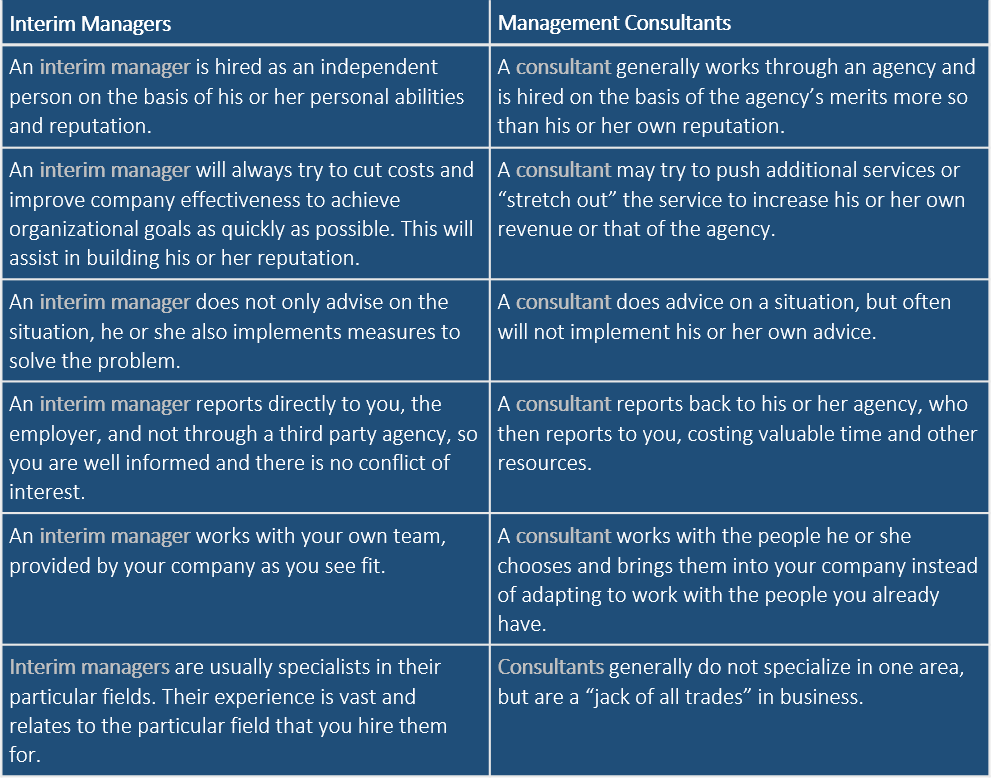Monthly Archives: April 2016
Interim Management vs. Management Consulting
What is Interim Management and how is it different from Management Consulting?
posted by: Peter Roest | Managing Partner, April 16th, 2016
Interim Management is one of the latest forms of troubleshooting management techniques which has come into existence in recent years. In this paper, I will explain what Interim Management exactly is. Then I will go onto describing the critical difference between an Interim Manager and a Management Consultant. Lastly, I shall provide the reader with an overview of the Interim Management industry today.
According to the Interim Management Association, “Interim Management is the rapid provision of senior executives to manage change or transition”.
In simpler terms, an interim manager is a highly experienced and specialized executive whom you can employ in your firm for a short period of time to solve a specific business problem. He is a master project manager and will not only act as a consultant and give you advice, but also solve the problem for you.
Let us take a hypothetical example to understand this better.
Company X has been performing badly for the past 5 years. It is a family run business and due to the internal politics amongst the family members, the company has lost its competitive edge in the market.
To make the situation worse, the Managing Director has suddenly resigned. Now, the Chairman of Company X realizes that the existing management team is inexperienced and incapable of running the company.
So, he has two alternatives. He can source and hire an existing senior level executive from another company and employ him or her on a permanent basis. But finding the right person uses valuable resources and takes a lot of time. In addition, the placement of a new senior staff member may cause further conflict between family members and insecurities in their roles, and they may seek work elsewhere. And worse, if the new executive turns out to be the wrong choice, removing him or her will be difficult.
The much better alternative is to employ an Interim Manager! Such an executive offers both past experience in short-term troubleshooting and company efficiency, and specialization in the particular field and can bridge the time required by the Chairman to identify a qualified external candidate or indeed identify and groom internal talent to take on the role full-time.
The Chairman will be able to select from a panel of executives deemed suitable by the interim management provider, and spend less time and money doing the legwork on his own. Existing employees will feel less threatened by the interim manager because of the limited time he or she will spend with the company.
An interim manager provides the solution to any number of problems in business. They are committed to their role as a short-term staff member and their varied experience in critical situations gives them a strategic advantage when handling new problems.
For a layman, it may appear that “interim manager” is just a fancy word for a management consultant. This is not the case! Some of their responsibilities do overlap, but there are very simple – and important – differences between them.
Let us investigate this properly.
What are the differences between Interim Managers and Management Consultants?
There is a vast distinction between an interim manager and a management consultant. Although on the surface they appear to be similar roles, their functions are quite distinguishable. Essentially, an interim manager is a management consultant, but a management consultant is not an interim manager.
Their core differences are outlined below:

It is clear, then, that an interim manager is able to perform a far more specialized job for your company, using your own resources and reporting only to you. He or she does a “start to finish” job: overseeing the company’s current operations, developing strategies for improvement and then implementing the strategies.
A recent survey of 100 senior directors reported that 78 per cent of them feel that interim managers are a better option than management consultants. What this all means is that the interim management industry is beginning to expand. Companies increasingly prefer interim managers to their consultant counterparts because of the more complete service that they offer.
Interim Management Trends
The interim management industry is a relatively new field. It was borne into the European market in the 1970s and 80s and is projected to grow further in the coming years. It originated in order to be able to provide fast, specialized top management service in times of company and management crisis.
For example, at the time of its introduction to the Netherlands in the 1970s, companies were dealing with long terms of notice and high termination pay-outs. The oil crisis had occurred and industries faced a major setback. As a result, highly skilled and experienced managers were required on an immediate basis in order to rebuilt companies that were failing. And so interim management was born. Similar situations have occurred in other countries in Europe. Over the past 20 years, the size of the market has grown steadily.
The interim management market offers different areas of specialization, and these have and these have different rates of demand. All are highly competitive. Areas with the highest demand are schools of Human Resources and Finance & Operations, which account for almost 20 per cent of all assignments. Lesser levels of demand are found in areas including Purchasing, Supply Chain and IT. However, the highest remuneration is for IT and Managing Director/CEO roles.
The public sector employs almost 20 per cent more interim managers than the private sector, but there is evidence of a gradual growth in their employment within privately owned companies. Interim mangers are beginning to enjoy an excellent reputation for quick and effective strategic management, and this is contributing to industry awareness.
The interim management industry as a whole has experienced excellent growth in the past few years and it is expected that it will continue to grow at an accelerated rate in years to come.
What does this mean?
Despite its relative youth in the management industry, interim management has grown steadily. There is an excellent opportunity for individuals to become involved in interim management while it is still growing – “on the ground floor”, so to speak. There is basis for thinking that interim managers will begin to take over from management consultants as companies become even further specialized and have even more requirements for quick solutions.
Interim Management is here to stay!
originally posted on: www.interimmanagement.com
Six Sigma: “Improving Quality Systematically”
Six Sigma
“Improving Quality Systematically”
By Peter Roest | Managing Partner, April 1st 2016
Six Sigma is a rigorous, focused and highly effective implementation of proven quality principles and techniques. Incorporating elements from the work of many quality pioneers, Six Sigma aims for virtually error free business performance.
Sigma is a letter in the Greek alphabet used by statisticians to measure the variability in any process, and if you can keep the output of that process within a six sigma-wide band (in effect, no more than 3.4 defects per million outputs), you can be confident that your process is operating as it should.
Six Sigma focuses on improving quality (and therefore reducing waste) by helping organizations produce products and services better, faster and cheaper. In more traditional terms, Six Sigma focuses on defect prevention, cycle time reduction, and cost savings. Unlike mindless cost-cutting programs which reduce value as well as quality, Six Sigma identifies and eliminates costs which provide no value to customers.
Typically a Six Sigma project consists of two elements. Using a framework called DMAIC (Define-Measure-Analyse-Improve -Control) organizations set out to deploy a set of tried and tested improvement methods and second a small contingent of in-house six sigma leaders are trained to a high level of proficiency in the application of the aforementioned techniques to ensure the improvements are sustainable and continuous.
Accelerate Evolution’s team is well-versed in the practical application of Six Sigma methodologies and we are more than prepared to assist your organization with its Six Sigma projects.
Please click here to contact us for more information as to how Accelerate Evolution can assist your organization with their Six Sigma projects
IBP: “Where Business Strategy meets Operations Management”
Integrated Business Planning
“Where Business Strategy meets Operations Management”
Companies have been achieving improved business performance for close to three decades by implementing and operating with an integrated business management process known as Sales and Operations Planning (S&OP).
A significant number of companies have led the evolution of S&OP from fundamental demand and supply balancing to an integrated strategic deployment and management process. This evolving process is known as Integrated Business Planning (IBP).
IBP is a process led by senior management that evaluates and revises time-phased projections for demand, supply, product and portfolio changes, strategic projects, and the resulting financial plans. This is done at the aggregate level on a monthly basis, typically over a 24-month or greater rolling planning horizon. It is a decision-making process that realigns the tactical plans for all business functions in all geographies to support the company’s strategies, business goals, and targets.
A primary objective of Integrated Business Planning is to reach consensus on a single operating plan to which executives of the management team hold themselves accountable and allocate the critical resources of people, equipment, materials, time, and money to most effectively satisfy customers in a profitable way.
Through their involvement, both in steady-state operational roles as well as in design / development and implementation / deployment project roles, in a variety of different industries, members of the Accelerate Evolution team are very well positioned to assist organizations with their IBP/S&OP projects.
Our Associates are often deployed in an Interim Management capacity to revive an existing S&OP or IBP process and help making it sustainable, or in a Advisory / Project Management role to help organisations to either design and deploy their first iteration of basic S&OP or indeed help them move up the ladder towards advanced S&OP / IBP.
Contact us to find out more about how we can best help your organization design, deploy and/or run an impactful and effective business planning process.
Popular Tags
- business operations management change management coaching & training commercial operations management Finance & GRC GEIT human capital management Information Technology interim management IT Governance Legal management advisory Marketing & Positioning project management Regulatory strategy & business transformation supply chain & logistics



























